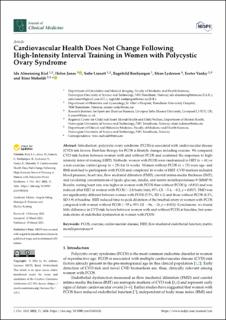Cardiovascular Health Does Not Change Following High-Intensity Interval Training in Women with Polycystic Ovary Syndrome
Kiel, Ida Almenning; Jones, Helen; Lionett, Sofie Buurgaard; Røsbjørgen, Ragnhild; Lydersen, Stian; Vanky, Eszter; Moholdt, Trine
Peer reviewed, Journal article
Published version

Åpne
Permanent lenke
https://hdl.handle.net/11250/3049454Utgivelsesdato
2022Metadata
Vis full innførselSamlinger
- Institutt for klinisk og molekylær medisin [3426]
- Institutt for sirkulasjon og bildediagnostikk [1860]
- Publikasjoner fra CRIStin - NTNU [37221]
- Publikasjoner fra Cristin - St. Olavs hospital [1459]
- Regionalt kunnskapssenter for barn og unge - Psykisk helse og barnevern [265]
- St. Olavs hospital [2441]
Sammendrag
Introduction: polycystic ovary syndrome (PCOS) is associated with cardiovascular disease (CVD) risk factors. First-line therapy for PCOS is lifestyle changes including exercise. We compared CVD risk factors between women with and without PCOS and examined the responses to high-intensity interval training (HIIT). Methods: women with PCOS were randomized to HIIT (n = 41) or a non-exercise control group (n = 23) for 16 weeks. Women without PCOS (n = 15) were age- and BMI-matched to participants with PCOS and completed 16 weeks of HIIT. CVD markers included blood pressure, heart rate, flow mediated dilatation (FMD), carotid intima-media thickness (IMT), and circulating concentrations of lipids, glucose, insulin, and matrix metalloproteinase-9 (MMP-9). Results: resting heart rate was higher in women with PCOS than without PCOS (p =0.011) and was reduced after HIIT in women with PCOS (−2.8 beats/min, 95% CI: −5.4, −0.2, p = 0.037). FMD was not significantly different between women with PCOS (5.5%, SD 4.1) and those without PCOS (8.2%, SD 3.9) at baseline. HIIT reduced time-to-peak dilatation of the brachial artery in women with PCOS compared with women without PCOS (−55 s, 95% CI: −96, −13, p = 0.012). Conclusions: we found little difference in CVD risk factors between women with and without PCOS at baseline, but some indications of endothelial dysfunction in women with PCOS.
